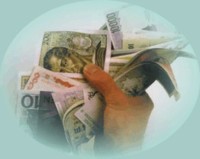Money laundering scandal could finish off carbon trading
 The EU’s Emissions Trading Scheme (ETS) is the ideal environment
The EU’s Emissions Trading Scheme (ETS) is the ideal environmentfor laundering money - and if such a scandal emerges, it will mean
the end of the cap-and-trade programme, a leading investment banker
has warned.
Louis Redshaw, head of environmental markets at Barclays Capital
(Barcap) in London, one of the most active institutions in the
carbon market having traded some 5 billion tonnes to date by his
own estimate, said that the concept of cap-and-trade to control
greenhouse gas emissions is in a fragile state, following an
estimated €5 billion ($7 billion) VAT fraud in carbon credits and
thefts of EU allowances worth €45 million.
“We have had a series of scandals that have rocked the market to
date. I will be slightly sensationalist and say one more shock to
the system and there won’t be any more cap-and-trade - it will be a
carbon tax. And that one more shock is going to come in the form of
money laundering, or something else,” he said.
Carbon credits are particularly suited to money laundering,
compared with other commodities, as there is no cost of taking
physical delivery or moving them. They can also be moved
instantly.
“There are at least two member states talking to each other
about a money laundering activity, as we speak,” Redshaw said at
the Carbon Market Insights conference in Amsterdam yesterday.
Currently, “the vast majority of traders are steering well clear
of the [spot] market,” Redshaw said, because of the risks involved.
His principle suggestion for eliminating criminality from the EU’s
carbon market is to restrict trading to companies that have to
comply with the scheme and those that are financially
regulated.
The European Commission announced yesterday it will hold
stakeholder meeting on 15 March to discuss
proposals for dealing with the problems - which include
delaying delivery of allowances, restricting registry accounts and
the disclosure of the serial numbers of stolen allowances.
Confidence up, but one in 10 participants witness
illegal activity
Meanwhile, a survey of carbon market participants showed
confidence in the EU ETS is at an all-time high.
The survey, conducted in the last two months by research company
Point Carbon, revealed some 49% of 2,146 respondents agreed with
the statement that the EU ETS is the most cost-efficient way to
reduce emissions in the EU - the highest percentage achieved in the
six years the survey has been running. Meanwhile, 37% agreed that
the EU ETS is a mature market - another record high, up from 31%
last year.
Some 31 respondents said they had witnessed specific instances
of fraud, embezzlement, corruption or theft in connection with the
EU ETS. “While not a huge number, it is still worrying that one in
10 respondents [31 of 349 respondents to the question] report
having seen illegal activity in the market,” the report says.
Meanwhile, 85 people reported that they had seen fraud and
embezzlement in carbon offset projects under the UN’s Clean
Development Mechanism and Joint Implementation programmes - about
the same as last year, Point Carbon says.
Originally published in
target=”_blank”>Environmental Finance. Reprinted in GLOBE-Net
with the kind permission of the publisher.

